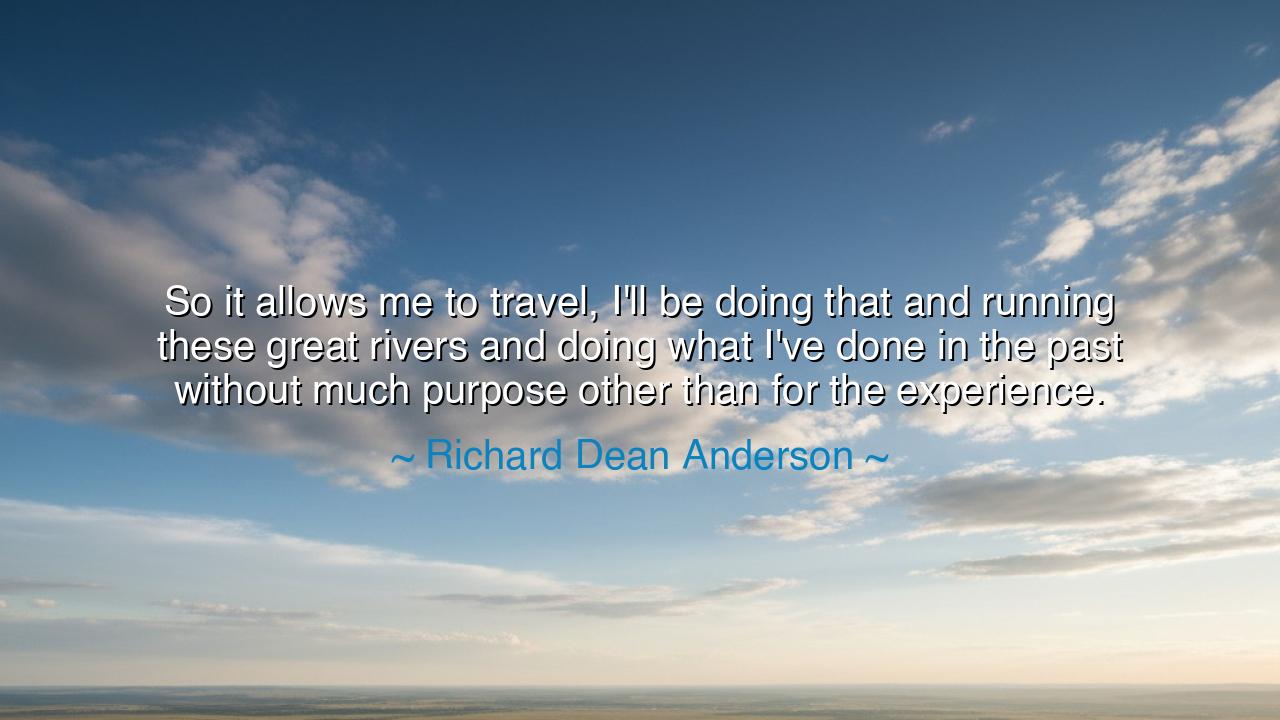
So it allows me to travel, I'll be doing that and running these
So it allows me to travel, I'll be doing that and running these great rivers and doing what I've done in the past without much purpose other than for the experience.






Hear, O wayfarers and seekers of wonder, the words of Richard Dean Anderson, who declared: “So it allows me to travel, I’ll be doing that and running these great rivers and doing what I’ve done in the past without much purpose other than for the experience.” Though humble and spoken as if offhand, these words shine with the timeless truth of the wanderer’s heart: that not all journeys must be tethered to achievement, that sometimes the highest purpose is to live without one.
To travel for the sake of the road itself, to move not because of duty but because of longing, is an ancient impulse. It is the spirit that once drove nomads across deserts and explorers across oceans. Yet Anderson strips away the grandeur and reminds us: there need not always be a mission, a conquest, or a prize. The act of going, of immersing oneself in the experience, is purpose enough. The world teaches us to justify every step with reason, yet here lies wisdom—that wonder itself can be the reason.
The image of the rivers is powerful. Rivers are the ancient pathways of humankind. They carve the earth, they feed the people, they carry the traveler from one land to another. To run a river is to surrender to its current, to allow oneself to be carried not by one’s own will alone, but by the living force of the earth. Anderson’s words remind us that there is a sacredness in flowing with life, in trusting the waters, in letting go of rigid plans to discover what lies beyond the bend.
Consider, O listener, the tale of Herodotus, who wandered far from his native Greece to record the lives and customs of Egyptians, Persians, and Scythians. His journeys were not guided by conquest nor by wealth, but by curiosity. He sought only to know, to gather experience, and in doing so became the Father of History. Like Anderson’s vision of running rivers, Herodotus shows us that to journey “without much purpose” can still shape the world with wisdom.
The meaning of these words is thus: life need not always be enslaved by goals. In the modern age, we measure worth by productivity, journeys by achievements, and days by accomplishments. Yet Anderson calls us back to an older truth—that experience itself, unmeasured and unbound, nourishes the soul. To walk without destination, to paddle without reason, is not waste—it is a way of learning the language of the world, a way of being fully alive.
The lesson, O child of tomorrow, is clear: allow yourself sometimes to live without rigid purpose. Let go of the endless chase for outcomes, and instead, immerse yourself in moments. Travel not only to arrive, but to wander. Sit by the river not only to reach the other side, but to listen to its song. For it is in such unstructured moments that the deepest truths are revealed, and the spirit is renewed.
Practical action follows: make time in your life for journeys without agenda. Walk through your city without a plan. Paddle on a river not to conquer it, but to flow with it. Travel to lands not only for sights to check off a list, but to breathe their air, taste their food, and share their silence. In doing so, you will discover that experience itself is a treasure, and that the soul is enriched not only by what it achieves, but by what it absorbs.
Therefore, remember Anderson’s wisdom: life’s greatest riches may not be found in purpose, but in presence. To travel, to run the rivers, to live for the experience—this is not idleness, but devotion to the mystery of existence. Walk this path, and you will find that even without purpose, your life will be filled with meaning, as the river is filled with endless flow.






AAdministratorAdministrator
Welcome, honored guests. Please leave a comment, we will respond soon